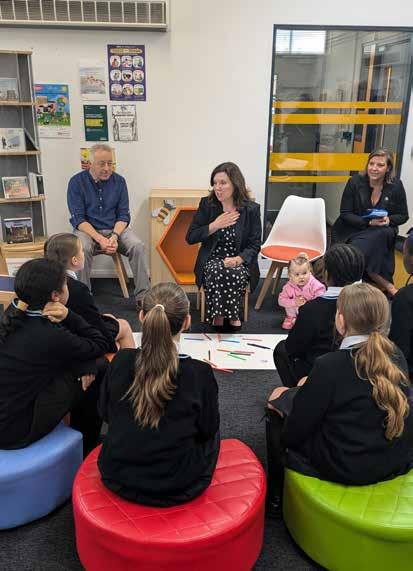MY PLAN FOR THE YEAR 2025–26


MY PLAN FOR THE YEAR 2025–26

As Children’s Commissioner for England, it is my job to listen to you and take your voices to decision makers.
In my survey, The Big Ambition, only one in five children felt listened to by the adults who make decisions about their lives. I have spent the past year – and will spend the rest of my time as Commissioner – changing this, because now is the moment to reshape how society thinks about childhood in England.
That starts with my new Festival of Childhood which will become an annual platform for young people to share their views. I also want to hear directly from you in The Big Conversation Survey – childrenscommissioner.gov.uk/ the-big-conversation – about what it’s like growing up in England, your hopes and ambitions and what would make England the best place to be a child.
Every child and young person deserves to feel listened to and empowered to have their say. Your voices are key to improving children’s policy and services. Next year, I will be producing child-friendly versions of my work for you to engage with. I want all government departments and public bodies to do the same.
My ambition is the same as yours. Children are not passive members of society – they should be considered in every piece of legislation which will have an impact on their lives.
My plan for the year sets out the things I will focus on in 202526 and for my remaining time as Commissioner, but my team and I will always stay on top of what matters most to you.

Dame Rachel de Souza DBE Children’s Commissioner for England
‘The government should listen to children’s ideas more and children shouldn’t have to pass their idea to an adult to make it happen … Children should be able to change the world too.’
– Girl,
11, The Big Ambition
As Children’s Commissioner, one million children and young people have told me about their experiences and aspirations. I have divided my work into seven areas that young people have told me are most important:
The year ahead – 2025-26 – will be my penultimate year as Children’s Commissioner. It marks 20 years since a Children’s Commissioner for England was created – a milestone that gives us an opportunity to reflect on the progress we have made and a reminder about the many urgent challenges that remain.
This year, I will pay particular attention to ensuring all the public services you rely on work for you, wherever you live. Childhood is short, and you should never be passed back and forth between services or left waiting for the help you need.
I will shine a light on why it’s important to put your views at the centre of solutions to the challenges you face. That means thinking broadly about your needs and consulting you when designing systems that are intended to support you. Health, education, social care, and justice must work together.
In this plan I share what I’ll be focussing on in the upcoming year to work towards making England the best place to grow up.
My work had 950 mentions across print, online and broadcast media last year, which had the total combined opportunity to be seen more than two billion times. I also took your voices and views to Parliament, with 86 mentions of my work. These are important because they bring issues to the attention of the public, and to politicians directly, to influence decisions made that affect your lives.
Some of my work that was talked about publicly the most included my research on the strip searching of children by police, my response to the tragic death of Sara Sharif and my report on why children got involved in the 2024 summer riots.
My work also helped to influence television dramas – my team advised on a storyline in the BBC soap EastEnders, where a 15-year-old girl was strip searched by police.
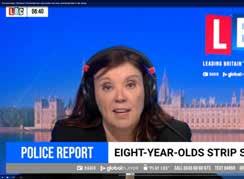
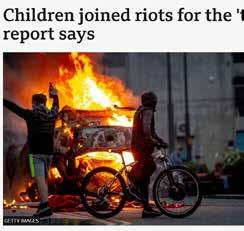
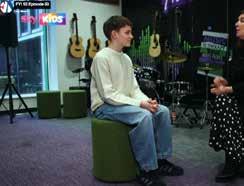



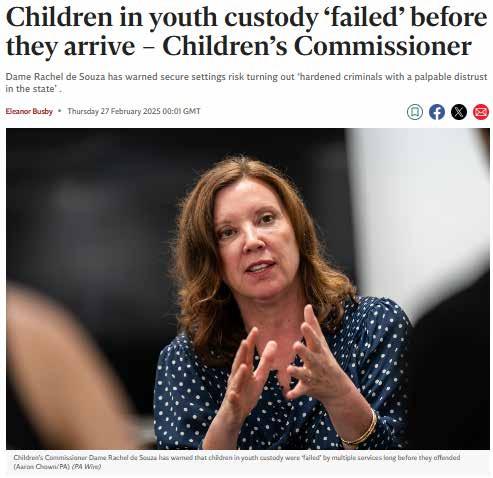


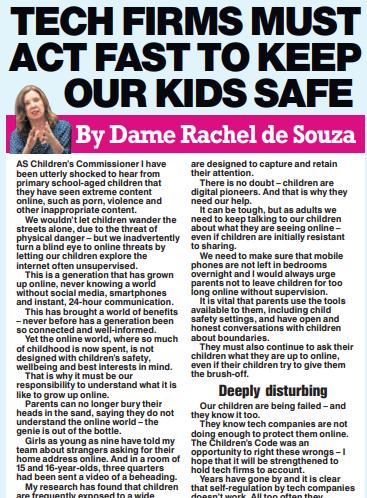
Visits
I also went on 98 visits to speak to children and young people across every region of England, touching on all key areas of my work. These included visits to young offender institutions, reception centres for unaccompanied asylum-seeking children, schools, children’s homes and hospitals.

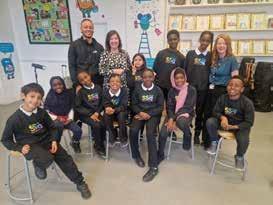
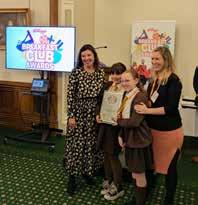
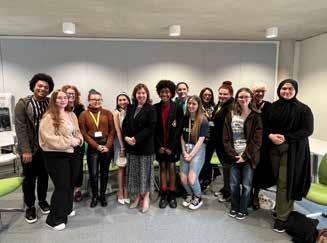




I will push for childhood to be taken more seriously in society, establishing a plan for England to fully incorporate the United Nations Convention of the Rights of the Child (UNCRC)
Over the course of your childhood, most of you will rely on some form of specialist support – whether that is from social care, for learning needs, or for health reasons. Those needs often overlap and interact – but the way services support you is often fragmented. This year, I will be looking at ensuring every child who needs support gets it, that services think about ‘additional needs’ in the round and that the professionals in your lives communicate with each other.
I will pay particular attention to ending situations that a child should never experience. For example, a child should never be inappropriately strip searched, sprayed with chemical incapacitant spray in custody, admitted onto an adult hospital ward, or wait months for necessary healthcare treatment to begin. A homeless family should never be placed by a council in Bed & Breakfast accommodation. No child should live in constant fear of being legally assaulted by a parent.
You deserve a school system that meets your needs. In September 2024, I launched the School and College Survey – the largest of its kind – gathering insights from ~90% schools and colleges across the country.
Schools and colleges are not just places of learning, they have become lifelines. They are supporting your mental health, additional needs, ensuring your safety inside and outside of school, and providing crucial assistance to families in need – but the education system is not yet equipped to sustain this expanding role.
Over the coming year, I will conduct further analysis of my findings and I will be highlighting the role schools and wider services play in supporting children with a range of additional needs and bringing them to government and policy makers.
‘What do adults expect us to do when we have nowhere to go, nothing to do?’
England should be the best place in the world to grow up, but there is too much variation in accessibility and quality of the services that you need.
This year, I am launching my most ambitious data project yet: Mapping Childhood. My team will create interactive maps to tell a compelling story about childhood in England, based on measures of the things children tell me are important.
I want to hear from all of you about your lives growing up in England and your dreams and plans for the future
Have your say in

Children and young people have told me they want an ambitious and socially conscious world with equal opportunities – a society where every child is heard, everyone can succeed and one with a healthy environment and planet.
Last year I:
› brought diverse young voices to the table with decision makers;
› expanded youth participation with my Youth Ambassadors Programme;
› shared children and young people’s ideas to shape national policy;
› launched The Big Conversation: The Children’s Commissioner’s Podcast, hosted by my Youth Ambassadors who interview policy makers and share views of children and young people. You can listen on Spotify, Apple Music or Amazon;
› introduced The Big Conversation Survey on my website, giving you a direct way to tell me about your lives;
› created The Big Ambition Maps, an interactive map of all children’s responses to The Big Ambition; and
› learnt from other countries about their systems for education, health, justice and social care to put forward recommendations on how to improve ours.
My plan for this year:
› empower young people to share their voices to influence decision-makers, and ensure these shape new policy;
› hold the first Festival of Childhood, a key moment in giving young people direct access to adults in positions of power and raising a call to action for decision-makers to listen to and act on what young people say;
› ensure special educational needs and disabilities (SEND) reform reflects the experiences of young people, supported by my recently formed Youth SEND Panel;
› support young people to become global citizens, looking at international practice and working collaboratively on issues that affect children across the UK and globally;
› bring a new cohort of 17 young people onto my Youth Ambassadors Programme to amplify the voices of under-represented children, including children with disabilities and additional needs, young carers, care-experienced young people and children from ethnic minority backgrounds.
‘The
government should listen to children’s ideas more and children shouldn’t have to pass their idea to an adult to make it happen. Children should be able to change the world too.’
– Girl, 11, The Big Ambition
Children have told me they want access to enriching activities, things to do in their local area and to feel safe in their online and offline communities.
Last year I: My plan for this year:
Offline
› focused on protecting children from harm, ensuring your rights are upheld, and advocating to make the justice system fairer and more considerate of children’s needs; and
› looked in detail at children’s experiences with the police, courts, and youth justice system, including the strip searching of children in England and Wales, the educational backgrounds of children in custody, children who have been victims of crime and children who got involved in the 2024 riots.
Online
› shaped the national conversation on online safety, exposing the prevalence of harmful content and ensuring children’s voices shaped policy, regulation and industry standards; and
› focused on making children’s digital experiences safer by design, exposing tech companies’ failures to remove harmful material quickly or prevent children from being exposed to it and calling for urgent action from government and industry.
‘I think the Government should try to make children feel safe whoever they are, wherever they are.’
– Girl, 9, The Big Ambition
Offline
› investigate ’child-centred policing’ that builds trust and puts children’s needs first, so that every interaction with the police leaves children safer;
› explore the reasons children are losing trust in the police and how this trust can be rebuilt;
› look at the youth justice system and measure children’s access to justice and their rights as victims;
› push to end large prison-like settings for children and explore how criminal justice decisions impact children’s futures;
› investigate what motivates children who commit violent acts, and systems that need to be in place to protect the wider public and provide support.
Online
› push for stronger protections in online safety, social media regulation, and digital design;
› examine whether the Online Safety Act is truly keeping children safe online and hold platforms accountable for their role in child safety;
› investigate how design features on social media affect children and whether influencers have a positive or negative impact, looking at issues such as financial exploitation, unrealistic body standards, and misinformation;
› engage with specific groups who face additional challenges navigating the online world and the support they need;
› push for urgent action from government, tech companies and decision makers on issues such as online grooming, self-harm content, and the spread of harmful ‘health, beauty, and wellness’ trends targeting children.
Children in the social care system have told me they want to receive the support, protection, and opportunities they need. Every child who experiences the social care system should feel supported, listened to and, above all else, safe.
› worked to ensure children in the social care system are truly listened to, and their views are heard;
› focused on getting families consistent, effective help to improve children’s welfare, and to stay together wherever it is in a child’s best interests;
› looked into what is required to make sure every child in care has a loving stable home and ensuring any child who needs secure care receives it in an integrated, homely environment;
› examined Child in Need (CiN) plans for children who need extra support to live safely, building a clearer picture of the support available for families;
› continue to support children within the social care system through my Help at Hand service. Last year I: My plan for this year:
› carried out work commissioned by the Department for Education to investigate the experiences of children under Deprivation of Liberty court orders and advocated for stronger safeguards for children placed in restrictive settings, using the evidence as part of an intervention in the Court of Appeal;
› strengthened support for professionals in higher education working with care experienced young people by producing guides with my Care Experienced Advisory Board;
› provided support to young people through my Help at Hand advice service;
› advocated for unaccompanied asylum-seeking children, ensuring they receive proper care, legal protections, and support.
‘Everyone should have a safe place to live. They want somebody to love them and treat them well like their family.’
–
Girl, 10, living with family other than parents/kinship carers, The Big Ambition
› investigate how local authorities, schools, police, and health services communicate and work together to share necessary information about children’s needs. A key aspect of this will be how a unique child identifier (an ID number for every child that means services know their backgrounds) can be successfully implemented;
› explore the subject of the criminalisation of children in care and circumstances when they are wrongly treated as adults instead of children, advocating to make sure they receive fairness and support;
› push for national consistency in care standards, support and opportunities;
› shine a light on the need for every child to grow up in a home-like environment and never in an institution;
Help at Hand is my advice and assistance service for children in care, living away from home, with a social worker or care leavers under 25 and their advocates on any child rights issue.
Help at Hand can offer support and advice if: You’re not getting the right support / You don’t feel heard / You are being asked to move / You are worried about housing or finances / You feel unsafe childrenscommissioner.gov.uk/help-at-hand
Children have told me they want a good experience of education with great opportunities to support their futures and the space and an environment conducive to learning and building life skills. Children deserve access to high-quality, personalised education, regardless of their background or needs.
Last year I:
› collaborated with schools, local authorities, and government to drive real change for children;
› focused on attendance and inclusion, including through project with 10 local authorities in Greater Manchester based on improving school attendance to provide a template for tackling school absence in other areas;
› ran the largest-ever data collection survey of schools and colleges, providing unprecedented insights into the challenges faced by education settings which will shape this year’s work;
› created the first-ever individual pupil database of children who leave state education, providing new insights into school transitions, absenteeism, and the challenges faced by children who are not in education;
› shared these insights directly with ministers and a group called the Attendance Action Alliance, shaping national conversations on attendance and school engagement;
› published detailed analysis of children missing education, highlighting the barriers that prevent children from reentering education, the gaps in local authorities when it comes to tracing these children, and the long-term risks of prolonged absence from school. These findings influenced my response to the government’s Children’s Wellbeing and Schools Bill, ensuring that the needs of these children remain a priority when changing the law;
› provided evidence to the Curriculum and Assessment Review to share the needs and aspirations of children for an education system that prepares them for life, work, and the future they want to build;
› advocated for children with special educational needs and disabilities (SEND) through evidence submitted to the Education Select Committee and , forming the first-ever Youth SEND Panel, ensuring that young people with SEND directly inform my work.
My plan for this year:
› look at how well schools and colleges are set up to support all children, particularly those with additional needs;
› push for significant SEND reform, exploring how services work together and communicate with each other;
› continue to research the barriers to school attendance and absenteeism, so children can attend school regularly and get the support they need for mental health challenges and SEND needs;
› focus on the role of schools as a hub for support from multiple services. Schools and colleges are no longer just places of learning – they are lifelines for children’s wider support needs.
‘[schools]
should have accessible counselling services, mental health education, supportive environments, and accessible resources.’
– Boy, 16, The Big Ambition
Children have told me how important supporting families is to help them to grow up safe, healthy, and with the opportunities needed to thrive.
Last year I: My plan for this year:
› focused on poverty, housing, and implementing the recommendations from my review into family life and the benefits of a strong family unit on your future –ensuring that government policy truly reflects the needs of families across England;
› played a key role in shaping the government’s response to child poverty, working with its new Child Poverty Unit to make sure the experiences of children growing up in poverty inform future policy decisions;
› pushed for changes in the systems set up to support families through financial hardship;
› looked into the role of schools in family support –including by gathering new evidence through my Schools and Colleges Survey on how schools help families with free food, childcare before and after school and by providing services like family hubs or children’s centres;
› looked at the impact of housing instability on children, showing a clear link between multiple house moves and GCSE performance – I will continue to push for decisions that take account of children’s experiences of poor quality housing.
› push for policies that support families, ensuring that every child grows up in a stable, nurturing environment;
› shine a spotlight on the realities of poverty for children growing up in 2025, and the importance of family support;
› embed children’s voices into the government’s Child Poverty Strategy to shape national policy solutions, ensuring their real-life experiences drive action to reduce deprivation;
› explore how deprivation impacts children in their day to day lives, and what this looks like in practical terms for children living in temporary accommodation, overcrowded conditions, or homes in disrepair;
› work to secure equal protection for children as adults receive – ending the legal assault of children, continuing to push for the removal of the defence of ‘reasonable punishment’ and highlighting international evidence to show the benefits of preventing children from being physically punished;
› support early childhood development and looking at how childcare can be made more available to families with young children, so every child arrives at school ready to learn in Reception year.
‘To
make children’s lives better they should make sure every child has a place to call home and parents who love and care for them.’
– Girl, 11, The Big Ambition
Children
have told me they want to grow up feeling happy, healthy and well, with access to support quickly and locally when they need it.
Last year I:
› pushed for systemic improvements in children’s health, particularly in mental health services, neurodevelopmental support, and safeguarding within healthcare settings;
› highlighted critical gaps in service provision;
› exposed failures in neurodevelopmental support – revealing that children are still waiting years for assessment and diagnosis, delaying their access to vital support and forcing families into crisis;
› called for urgent health reforms, including how health, education, and social care services work together so that children’s health needs are identified early and they can get support without needing to wait for a formal diagnosis; and
› scrutinised the provision and funding of children’s mental health services, ensuring children have timely access to support.
My plan for this year:
› embed children’s health needs in national policy, particularly in bringing their experiences and views to shape the NHS 10-Year Plan;
› explore, in more detail the gaps in care provision around the country and improve coordination between services to prevent unnecessary hospital admissions;
› investigate the number of children in hospitals, the reasons for their prolonged stays, and the barriers preventing them from receiving care closer to home;
› track how well and how quickly mental health services are meeting the needs of children and young people;
› look into care for children with life-limiting conditions –examining how services for these children are different from those in adult services, and getting a better understanding of children’s perspectives on assisted dying for adults;
› explore children’s exposure to harmful cosmetic products on social media, the extent to which they play a role in fuelling children’s low self-esteem, and what further regulation is needed to change this.
‘All
children need access to free healthcare, not just mental health, and I think this is the biggest thing the government can work on to help us.’
– Girl, 17,
The Big Ambition
Children have told me they want to be supported into adulthood with access to high-quality careers advice, work experience, and post-16 education opportunities that set them up for success. I want to ensure every young person, regardless of background, has what they need to thrive in adulthood.
Last year I: My plan for this year:
› focused on improving support for care leavers and young people in post-16 education, ensuring they have the guidance, opportunities, and stability needed for a successful transition into adulthood;
› published a handbook created with my Care Experienced Advisory Board for professionals working in higher education, focused on how to support care experienced students, encouraging them to recognise and respond to the challenges they face;
› published a Hierarchy of Needs for Care Experienced Young People – a visual guide to help any professionals working with them understand what they need to feel supported;
› released a comprehensive report on post-16 alternative provision, addressing the gaps in education, training, and employment support for young people not in mainstream education and shared my recommendations with government and education policymakers to ensure that alternative provision leads to real opportunities.
› improve different career routes for young people, particularly those with additional needs, based on evidence from my Schools and Colleges Survey;
› make sure colleges provide the right support for students as they transition into adulthood;
› push for reforms that give every young person with additional needs a clear, accessible route into work or further study;
› push for more accessible and inclusive work experience programmes;
› assess whether young people in the secure estate have access to educational and vocational training and are receiving the right support to develop employability skills and reintegrate into society.
‘There should be more awareness of the university courses, as well as more degree apprenticeships.’
– Girl, 17, The Big Ambition

